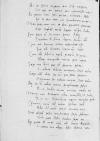List #783
Helius EOBANUS Hessus (KOCH) do Ioannes DANTISCUS[Nuremberg], [1532-05-04]
Rękopiśmienne podstawy źródłowe:
Podstawy źródłowe - stare druki:
Publikacje:
| ||||||||||||||||||||||||
Tekst + aparat krytyczny + komentarzZwykły tekstTekst + komentarzTekst + aparat krytyczny
Reverendissimo principi ac domino, domino
Reddita
Tempus erat, Tartesiacas iam
Stabat anhelanti praecipitandus equo,
Parca sedebamus non magnae ad fercula cenae,
Cum Tua sunt manibus tradita scripta meis.
Protinus appositae contempsimus omnia coe mensae,
Legim superinscribed in place of crossed-out b⌈bmm superinscribed in place of crossed-out b⌉us et manibus verba notata Tuis.
Nec legisse semel fuerat satis, inter edendum
Lecta quater nobis littera tota fuit.
Inde animis laeti et tamquam votiva ferentes
Sumpsimus audaci pocula plena manu,
Proque Tua sacrum
Fecimus et
Scilicet incolumem non Te laetemur amici
Venisse ad rapidi litora
Et quia Te scribis
Visurum
Hanc quoque gratamur sortem Tibi, sed tamen illic
Nonnihil adversi, quod quereremur, erat.
Sicut enim gratum est patrios Te invisere fines,
A nobis sic Te tam procul ire dolet.
Ibis ad aequoreos sine me, Dantisce,
Heu oculis iterum quando vidende meis?
Ibis ad arctoas
Qua Tibi sunt
Illic, ut fueris propria iam sede receptus,
Dic, age, qui poteris non meminisse mei?
An poteris cari fieri, precor, immemor Hessi,
Qui Te tam vere, nec simulanter, amat?
Non puto, nam nec Te duri genuere parentes
Nec stupidum tardo frigore pectus habes.
Quin potius, cum sis mira pietate fideque
Praeditus et summo dignus honore coli,
Cum Tua fortunae virtus respondeat isti,
Quae Tibi divitias ingeniumque dedit,
Cum Tibi subiecto populo potieris et arces
Altaque tranquilla moenia pace reges,
Saepe meo dices, quaenam fortuna poetae
Lubrica deducat tempora, scire velim,
Saepe meum dices, seu nunc pia fata poetam
Numina, seu videant impia, scire velim,
Atque ea, cum volves animo graphiaria posces
Et scribes animi nuntia verba Tui.
Namque nec
Et nec
Communis mecum sub eodem sidere caeli,
Milia sed tantum pauca remotus eris.
Unde aliquam possis transmittere saepe salutem,
Unde queas Hesso scribere saepe Tuo,
Quo queat et mitti nostrae Tibi littera dextrae,
Littera non aliqua lassa futura via,
Nam quae nunc reliquos aderit mihi
Quanta futura mihi est, tanta futura Tibi est.
Hoc Tibi Maeonio dici dignissime versu
Voce Si written over y⌈yii written over y⌉byllina certius esse puta.
Accipe nunc Tibi devotum, Dantisce, poetam
Exhibitas vates, accipe vatis opes.
Quas quia non alias habeo, quae mittere possum
Munera, non animo despiciente feres.
Hoc Tuus ille animi candor promittit et ille
Qui mihi de tali pectore spirat amor.
Vive diu victure meis, Dantisce,
Vive, brevi versus subsequar ipse meos.




 UUB, H. 154, f. 84v
UUB, H. 154, f. 84v